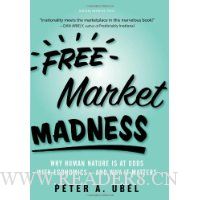
基本信息出版社:Harvard Business School Press
页码:224 页
出版日期:2009年01月
ISBN:1422126099
International Standard Book Number:1422126099
条形码:9781422126097
EAN:9781422126097
装帧:精装
正文语种:英语
内容简介 在线阅读本书
Humans just aren't entirely rational creatures.
We decide to roll over and hit the snooze button instead of going to the gym. We take out home loans we can't possibly afford. And did you know that people named Paul are more likely to move to St. Paul than other cities? All too often, our subconscious causes us to act against our own self-interest.
But our free-market economy is based on the assumption that we always do act in our own self-interest. In this provocative book, physician Peter Ubel uses his understanding of psychology and behavior to show that in some cases government must regulate markets for our own health and well-being. And by understanding and controlling the factors that go into our decisions, big and small, we can all begin to stop the damage we do to our bodies, our finances, and our economy as a whole.
Ubel's vivid stories bring his message home for anyone interested in improving the way our society works.
作者简介 Peter A. Ubel is a physician and behavioral scientist at the University of Michigan, where he directs the Center for Behavioral and Decision Sciences in Medicine. A prominent thinker in medicine and other fields, he has written for numerous science publications as well as the Los Angeles Times, the New York Times, and the Huffington Post. His appearances on radio and television shows include Talk of the Nation, All Things Considered, and Fresh Air.
媒体推荐 "The American physician is causing quite a stir across the Atlantica?|" --Times of London
"Ubel presents a nuanced treatment of issues often reduced to sound bites" --Publishers Weekly, 2008
"...intriguing..."--The New York Times
"an undeniable power to these examples" --Freakonomics blog, The New York Times
"a useful and stimulating book...loaded with information about the ways manufacturers, retailers and advertisers manipulate tastes and appetites." --Toronto Star
an undeniable power to these examples --Freakonomics blog, The New York Times
专业书评 According to Ubel, physician and behavioral scientist at the University of Michigan, marketers exploit basic human irrationality to persuade people to consume dangerously unhealthy foods and spend more money than they have. Contending that capitalism inherently exploits its participants' vulnerabilities, Ubel posits that it's the government responsibility to guide people to act in their own self-interest with educational campaigns and, possibly, taxes or restrictions on advertising to children. The book explores why such measures have been criticized with a swift discussion on free-choice economics and modern-rationalist economists; equal time is devoted to the findings of scientists and psychologists that rebut such perspectives. While Ubel presents a nuanced treatment of issues often reduced to sound bites, his arguments can be difficult to follow; further, his disdain for everything from snack food to beer, television and expensive prescription drugs might strike some readers as sanctimonious.
Copyright © Reed Business Information, a division of Reed Elsevier Inc. All rights reserved.
目录
Part I. The Evolution of Homo economicus: Belief in Reason, Faith in Markets 1) The Invisible Hand Meets the Unconscious Brain 2) 19th Century Economics and the Mathematics of "Happiness" 3) 20th Century Politics and the Triumph of Chicago Libertarianism
Part II. The Rise of Behavioral Economics 4) Librarians, Fighter Pilots and the Limits of Rationality 5) Cashews, Coffee Mugs and the Birth of Behavioral Economics 6) Marketing and the Science of Persuasion: Madison Avenue Masters Behavioral Psychology
Part III. Irrationality Hits Home 7) Spacious Lawns and Long Commutes 8) Unconscious Appetites and Expanding Waistlines 9) Impulsive Behavior and the Battle Between our Current and Future Selves 10) Risky Feelings and Cigarette Breaks 11) The Price of Life and the Cost of Healthcare
Part IV. Human Nature and the New Paternalism 12) Kinder, Gentler Paternalism 13) Balancing Liberty and the Pursuit of Well-being
……